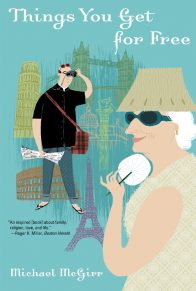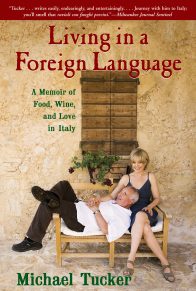Veterans of film, TV and theater, Jill Eikenberry and Michael Tucker have weathered much in their 36-year marriage: blended families, Eikenberry’s breast cancer, cross-country careers.
After years in the fast lane, they were looking forward to a slower pace. They bought and restored a 350-year-old farmhouse in Umbria, Italy—an experience Tucker wrote about in his first book, Living in a Foreign Language (Grove Press).
Then Eikenberry’s 90-year-mother was diagnosed with Alzheimer’s disease—and their plans changed. In this exclusive Lifescript interview, the couple talk about how they coped with Lora’s growing dementia, which Tucker captures in his new book: Family Meals: Coming Together to Care for An Aging Parent (Atlantic Monthly Press, 2009):
At the beginning of your journey, how did you handle Lora’s anger at what was happening to her?
Mike: When she got angry—which was often—I ran and hid in the other room.
Jill: I wanted to do the same, but instead I held her hand and talked to her for hours to convince her we had her best interests at heart.
My mother has been somewhat paranoid for years because of hearing loss in her mid-30s and the dementia made it worse.
When did you first notice that your mother was having cognitive problems?
Jill: When Mom’s second husband died several years ago, we decided to move her from California to New York—to a retirement community near us.
They had an assisted-care facility on the premises and we had someone check on her a few times a day.
It soon became clear that Mom needed full-time care.
What problems did you have with her?
Jill: She didn’t want anyone living with her. She became belligerent, partly because she doesn’t hear well and the aides didn’t know how to put her hearing aid in.
I was in the office complaining every day because there was no consistency of care and none of the aides seemed to know how to deal with dementia.
What were your next steps?
Jill: After realizing the retirement community wasn’t a viable option, we discovered that the apartment across from us was available and decided to move my mom in there.
Finding aides for my mom was a long, difficult process. It took three months of hell before I found two wonderful women through a family assistance network.
Now my mom has three fantastic caregivers. They all love her and she feels completely safe with them. She’d be lost without them—and so would I.
How is Lora now? How has her care integrated into your lives?
Mike: Lora is physically stable. Her mental state continues to decline slowly, but she still recognizes us and occasionally she speaks coherently.
The three aides cover her 24 hours a day. This gives Jill and me the time we need to go on with our lives and our careers.
You seem to have a solid marriage. Has caring for Lora strained your relationship?
Mike: No. Very early on, we realized that we had to get on the same side of this situation.
I was arguing for our life and Jill knew she was responsible for her mother’s life.
We pulled and tugged a bit until we realized we had to make sure that Lora had a good last chapter, while also ensuring our own chapters were as full and productive as possible.
Jill: After we moved my mother across the hall, I started inviting her and the aides over to our apartment daily. I soon realized that Mike felt invaded.
They now come over for special dinners or occasions, but mostly I go over there. I’ve had to learn to be grateful for Mike’s generosity and not push his limits.
Michael, in your book you mention feelings of resentment. How did you reconcile those?
Mike: My resentment in the beginning was seeing Jill’s personality change when she was with her mother. That was fine when Lora was 3,000 miles away and we saw her twice a year.
But when Lora began living across the hall − and failing mentally − I feared I would lose Jill as I knew her and that was hard to accept.
Was there a particularly frustrating or challenging moment in the transition?
Jill: The worst moment came just after we moved her to New York and into the retirement center near where we live. She told me I had taken her away from her friends and ruined her life.
I told her I would see her every day. She said, “You won’t. You’ll go away and leave me alone.”
Your two grown children—Alison, a personal chef, and Max—both moved to Manhattan to help care for Lora. What adjustments did they need to make?
Mike: I think our kids are getting a close-up look at what’s going to happen to us. They realize that they’ll have to figure out what to do when we can’t wipe the oatmeal off our chins.
Jill: Alison has a difficult time sitting with my mom and holding her hand because that’s not who she is—she’s a doer. She was always determined to help and has adjusted by cooking nurturing food, which makes her feel good and makes my mom want to eat.
In addition, Alison has a fabulous relationship with each of my mom’s aides.
Has Lora’s condition taken a toll on them?
Mike: Max and Alison share an apartment and watch out for each other. Max doesn’t visit my mother as often now that she’s less responsive. I think it’s hard for him.
He used to enjoy visiting with her and reading to her. Of course, it didn’t hurt that she lit up like a Christmas tree whenever she saw him.
Now the Christmas tree is on “dim,” and Max doesn’t know for sure that his visits are making a difference.
How do you address your own needs while taking care of Lora?
Mike: We just spent two months in Italy and Lora has been fine. We’ve found that getting away occasionally is essential.
Jill: I walk in the woods and do Pilates and yoga. I’ve also been seeing a wonderful therapist who has helped me understand a lot of my old patterns with my mother.
In many ways, this has been a tremendously exciting time of self-discovery and I’m able to discuss everything with Mike.
How has this experience changed your relationship with your mother?
Jill: I realized, with the help of my therapist, that I was still looking for my mother’s approval even after she was in a state of advanced dementia.
I have finally been able to let go of those expectations. It has helped me to really appreciate who she is now and the time I have with her.
I also realized how much I was still trying to make other people like her, which is something I’ve been doing since she lost her hearing many years ago.
As soon as I was able to let go, my stress level went way down.
Caring for a parent—particularly with Alzheimer’s—can be isolating. How did your friends respond?
Mike: It’s been a mixed bag. We have some friends who have been extraordinarily helpful—visiting Lora when we’re away, bringing her little gifts—and others who don’t want to participate at all.
Have you made any lifestyle or health changes?
Mike: My mother died of Alzheimer’s, so it’s on my mind. Brain exercises have been shown to have some effect in warding off dementia, so I do a crossword puzzle every morning. And Jill and I are learning a foreign language.
Jill: I’m taking some supplements for menopausal symptoms, which are supposed to help with memory. I also exercise and meditate every day to relieve stress.
Are there any changes you’d like to see in the treatment of Alzheimer’s patients?
Mike: We’re big supporters of preventive medicine. We think health care reform on that issue is way overdue.
Medicare and Medicaid have been working very well with Lora. Her aides are paid through Medicaid and we couldn’t have done it otherwise.
We’d love to see more government programs available to everyone.
After living part-time in Italy, have you noticed any differences in how the elderly are treated there versus in the U.S.?
Mike: The Italian system has influenced us considerably. Americans want to put their ailing and failing parents in a nursing home; Italians bring their relatives into their own homes.
The Italians often hire Eastern European women, called “badanti,” who leave their countries to come to Italy and provide 24-hour, live-in care for the elderly at a reasonable price.
In your book, you say that caring for the elderly in the U.S. has been institutionalized. Why do you think that’s happened?
Mike: It’s because Americans don’t want to have their old people where they can see them. Ours is a culture that worships youth and we don’t want to be reminded that it passes all too quickly.
The Italians − and many other cultures − revere their old people and enjoy having them around.
Many Lifescript readers are caring for parents with Alzheimer’s or dementia. Do you have any advice?
Jill: I would encourage people to find help and support. It’s so hard to manage it all on your own. The truth is, a person with eldercare experience can do it better than you can.
In caring for Lora, is there anything you wished you had done differently?
Mike: Moving Lora from California to New York was a disaster. She never recovered from that, but at the time, it seemed as if we didn’t have a choice.
I would encourage other people facing this dilemma to consider their choices carefully before they uproot a dementia patient because it can be so debilitating.
What has been the biggest surprise from this whole experience?
Mike: Seeing three generations of our family come together around this crisis. No one planned it; it just happened and we’ve never been so close.
What inspired you to write the book?
Mike: I wanted to tell Jill’s story. And I wanted people to know that, with love and empathy for each other, you can have it all—your life, along with caring for a failing parent.













